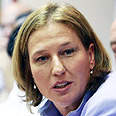
Tzipi heading for victory
Political sources increasingly convinced that Livni will win primaries, replace Olmert
Part one of political analysis
They hoped it won’t happen, but Likud members are starting to reconcile themselves to the possibility that Tzipi Livni will become Kadima’s next chairman. Therefore they are preparing, at least mentally, to complete against the leading candidate, according to the polls, in the ruling party’s primaries.
Senior Likud officials estimate that the Kadima battle has in fact been decided already, and Livni will be the one to replace Prime Minister Ehud Olmert.
With the primaries two weeks away, one should not belittle the estimate of senior Likud figures. It is based on vast political experience and conversations with various elements with Kadima, headed by those involved in Shaul Mofaz’s campaign.
“Mofaz’s people, who in the past said they are sure of their victory, are saying completely different thins at this time,” a senior Likud official says.
Apparently, he knows what he’s talking about. He is well familiar with what’s going on within Likud, but also in Kadima, which is filled with plenty of former Likudniks. “They are starting to falter. Mofaz’s momentum is over, and you can see it.
The ‘field activists’ who backed Mofaz have shifted their support to Livni, and this is a result of the work performed by Ronnie Bar-On and Tzachi Hanegbi. Mofaz has nobody who can lead a serious campaign for him, and I am 900% convinced that she (Livni) will be Kadima’s next chairman.”
This assessment also has implications for Likud’s political conduct: Benjamin Netanyahu, for example, makes sure to talk about Livni every time he attacks the prime minister over diplomatic issues. For him and for senior Likud officials Livni is the new rival and needs to be contended with. Once the general elections take place, the great political battle will be managed against her.
Elections? Not for sure
However, suddenly nobody in the political establishment knows when the next elections will be held. Very senior Kadima and Likud sources are convinced that Tzipi Livni’s position recently shifted. If up until now, the foreign minister’s advisors conveyed a sense of going to elections after the primaries, the feeling is that something has changed in recent days. Perhaps it’s the sense that victory is near, or the thoughts of becoming prime minister – one way or another, the previous messages have come to an end, or at least have been moderated.
“Suddenly,” says a senior Kadima figure, “she is conveying a sense of wanting to form a government. I’m hearing from more and more people that this is the direction now.” Senior Likud officials have formed the same impression.
“For a long time now we’ve been walking around with the feeling that general elections will be held,” says a source closely associated with Netanyahu. “Now, I’m no longer so sure this axiom will materialize.
Suddenly, Livni no longer talks about going to elections, but rather, more about an alternative government. This isn’t a coincidence. The pendulum in the political establishment is swinging in the direction of forming a new government.”
Political sources estimate that Livni realized that despite her popularity, she won’t be able to secure better results than what Kadima achieved in the last elections. Besides that, if she is appointed as prime minister, it is better for her to have a center-left majority in the Knesset.
According to most polls, the center-right bloc is expected to grow stronger in the next elections, so even if Livni forms the next government, it would be hard for her to continue leading talks with the Palestinians against an objecting Knesset, and possibly against the government she will be forced to form – and nobody guarantees that she will win anyway.
“I do not see willingness to go to elections,” a senior political figure says. “Livni’s associates are already starting to talk about the possibility of forming a government even with Shas, rely on a minority government, or perhaps add Shas later. These calculations convey a sense of a different atmosphere.”
Moreover, sources in the political establishment are estimating that the Pensioners’ Party, as well as Labor, both pulverized in the polls, won’t rush into new elections.
Part two of Attila Somfalvi’s political analysis will be published Thursday evening










